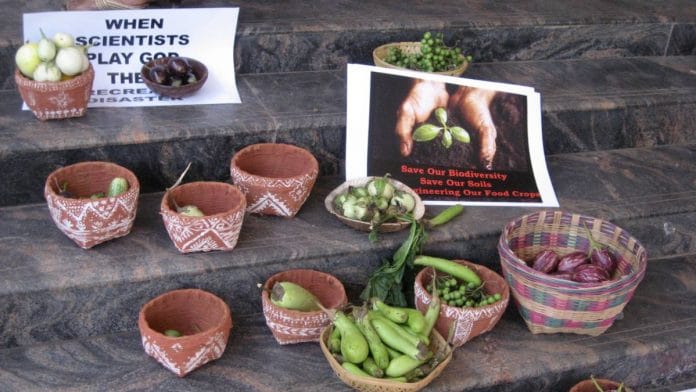New Delhi: Three months after it released a draft notification for the regulation of import and sale of genetically modified (GM) food items, the Food Safety and Standards Authority of India (FSSAI) is contending with several thousand hate emails clogging its inbox regularly, which far exceed the suggestions it had sought.
The mails, from activists, accuse the FSSAI of legitimising GM foods “irrespective of the risks they pose”. The authority, meanwhile, feels that it is because there are concerns in some quarters about GM food items that regulations are necessary, to ensure that anything and everything that is GM is not sold in the country.
The draft notification was first brought out in November 2021. Last month, an addendum was proposed that would also include enzymes of GM origin in the list of items to be regulated.
“We have received some 10,000-20,000 hate mails from activists. Most of them are copycat emails with the same content, but coming from multiple email ids, where we have been accused of legitimising GM food items without concerns about the threats they pose to people and the environment,” a senior FSSAI official told ThePrint.
“There is already quite some amount of GM items available, for example, we use GM soybean oil. Additionally, a lot of GM enzymes are used in the food industry. Unless we specify standards we cannot regulate. It is not as if they are not being sold now, when there are no regulations in place,” the official said.
Some of the mails, the official said, have sought six months to respond with suggestions on the notification, instead of the customary two. But this, he added, was not possible.
According to the draft notification, any food and food ingredient composed of or containing genetically modified or engineered organisms obtained through modern biotechnology, can be categorised as GM food items and can be regulated as such. Food and food ingredients produced from, but not containing, genetically modified or engineered organisms obtained through modern biotechnology, will also be included in this category.
Also read: India will lose on agri-tech, experts tell PM, seek quicker approval for gene-edited plants
Bt cotton only GM crop for which cultivation allowed in India
In 2002, the Government of India allowed the cultivation of Bt cotton, which is a genetically modified crop.
A Ministry of Agriculture and Farmers’ Welfare statement about a study on the cultivation of GM crops, released by the Press Information Bureau (PIB) in 2020, said: “Long-term studies were conducted by ICAR (Indian Agricultural Research Institute) on the impact of Bt cotton which did not show any adverse effect on soil, microflora and animal health.”
However, it added, the “Parliamentary Standing Committee on Science and Technology, Environment and Forests, in its report on ‘genetically modified crops and its impact on environment’, submitted to Parliament on August 25, 2017, recommended that GM crops should be introduced in the country only after critical scientific evaluation of its benefit and safety, and also recommended restructuring of regulatory framework for unbiased assessment of GM crops”.
The statement said the Genetic Engineering Appraisal Committee (GEAC), the government’s apex body for regulating genetically modified organisms, allowed biosafety research field trials of two new transgenic varieties of indigenously developed Bt Brinjal in eight states during 2020-23 only after taking no-objection certificate (NOC) from states concerned and confirmation of availability of isolated stretch of land for this purpose.
However, there is no control currently over readymade GM items that enter the country and are sold. The GEAC’s approval needs to be sought only when a food item has living modified organisms (LMOs), like agricultural crops.
The draft regulations
The draft regulations released by the FSSAI last November say that if a genetically modified or engineered food does not contain any LMOs, the FSSAI — on receiving an application for its approval — can seek additional data or supporting documents and can conduct its own safety assessment of the food item before granting approval.
For imports, the draft says that a company would need to submit to the FSSAI a complete dossier “as submitted and approved by the regulatory agency of the exporting country or complete dossier prepared by the applicant, three years’ data of the safe use of the GMOs derived food in the country of origin and evidence for export of the GMOs/LMOs derived processed product for food purposes with the information about the trade volume and name of the importing country/ies”.
(Edited by Poulomi Banerjee)
Also read: Modi govt’s ‘indecisiveness’ on GM crops slowed down research advancement, US agri dept criticises






